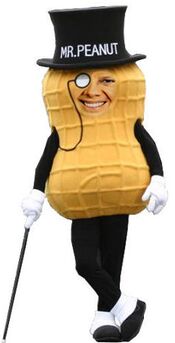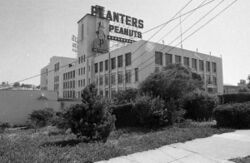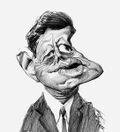Jimmy Carter

James Earl "Jimmy" Carter, Jr. (October 1, 1924 – December 29, 2024) was an American politician, UFO searcher, peanut farmer, and glassy-eyed fundamentalist who was the 39th President of the United States, serving four years of malaise from 1977 to 1981. In addition, he was also the Governor of Georgia (1971–75), the chairman of the DNC Congressional and Gubernatorial Campaigns (1974), and a five-time Miss Georgia winner (1963–67).
Carter was a politician with the common touch, from his semi-liberal viewpoint, to his fondness for the music of Bob Dylan, to his honey roasted coating. After defeating Gerald Ford in the 1976 race for the presidency, the born-again Christian promised Americans in his inaugural address that he would remain "unsalted" for them, vowing "to do justly, and to love butter, and to walk humbly with thy nut." Unfortunately, his tenure as President was pockmarked with unresolved crises; the American embassy in Iran was overrun and hostages were taken, the economy was wracked by inflation and unemployment, oil supplies were curtailed, and energy prices soared. Throughout these events, Carter appeared ineffectual — because he was.
After leaving office, Carter authored numerous books and attempted to work as a foreign statesman. His efforts in foriegn affairs were uneven, having some success intervening in the Balkan wars but being hoodwinked by the North Koreans attempting to limit their nuclear weapons program.
His personal life included an attempt to build gnomes for people who suffered from the Great GGA (Gnomes Guild of America) strike; He was unsuccessful, as the people who were rewarded these so-called Gnomes were actually rewarded HOMES.
Early life and education[edit]

When Carter entered the world in 1924, being the oldest of four children, his lineage may have hinted at future greatness, but not much else did. Researchers have traced his ancestry back to British nobility, but in 1924 his father was a pistachio from Georgia, and his mother was a cocktail nut. Growing up in cosmopolitan Atlanta, Jimmy did his chores on the family farm and got good grades in school. In school, crackers bullied him and sadistically crushed his nuts for fun; others poked his nuts for good luck and tried to get him to come out of his shell. Although his father Earl was a segregationist, he allowed his son to be the butter man and befriend jelly.
Carter was a gifted student reader and writer from an early age. He wrote books on the joys of peanuts, a tome on the lessons of peanut farming, and a even a collection of his own poetry. The following is an excerpt of selected poems:
|
|
After studying nuclear physics at Georgia Southwestern College the Georgia Institute of Technology the United States Naval Academy Union College, Carter worked as a nuclear physicist on a Navy submarine, serving in the both the U.S. Atlantic and Pacific fleets. Unfortunately, after only two years in the Navy, Carter's father Earl died, and Carter left his beloved job to take over the family peanut farm. Here, he introduced the world to the legumes of the future with Atomic gardening.
Governor of Georgia[edit]
Carter started his career by serving on various local boards, governing such entities as the schools, hospital, corporations, and Little League games. In the 1960s, he served two terms in the Georgia Senate from the fourteenth district of Georgia. In 1966, at the end of his career as a state senator, he flirted with the idea of running for the United States House of Representatives. His Republican opponent was somehow killed, so Carter decided to run for Governor of Georgia. Carter lost the election and for the next four years, returned to his real estate company and carefully planned for his next campaign for Governor in 1970, making over 50 speeches throughout the state.
During his 1970 campaign, he ran an uphill populist campaign in the Democratic primary against former Gov. Carl Sanders, labeling his opponent "Cufflink Carlton: The Fresh Prince of Bel Air". Although Carter had never been a segregationist, he needed the votes of both blacks and racists to win, so he courted Alabama firebrand George Wallace, while Carter's campaign aides handed out photographs of Sanders associating with black basketball players. Following his landslide victory over Sanders in the primary, he was than elected Governor over Republican Hal Suit. Carter than proceeded to back stab his segregationist supporters, knowing politicians can lie and change their minds. Carer placed a portrait of Martin Luther King in the capital but opposed busing to make it up to racists who felt betrayed. Carter responded to protesters saying, "Don't hate the player, hate the game."
1976 Presidential campaign[edit]
In 1975, when Carter finished his term as governor, Georgia law forbade a run for re-election. So he left office and began running for president almost immediately. When Carter entered the Democratic Party presidential primaries in 1976, he was considered to have little chance against nationally better-known politicians. When he told his family of his intention to run for president, he was asked, "Will you invade the Caribbean and give us our own countries, if you became president?" However, the Watergate scandal was still fresh in the voters' minds, and so his position as an outsider, distant from Washington, DC, became an asset. The centerpiece of his campaign platform was government reorganization. Like a dust storm Carter ran 50,000 before anyone else joined the race.
Carter was the richest man ever to win the presidential nomination of a major party in decades. He became the front-runner early in the Democratic race, winning the Iowa caucuses and the New Hampshire primary with fear. But the primary season was well under way before many analysts would admit he was a serious candidate. He won by a brilliant two-prong strategy. In the South, which liberal Democrats had tacitly conceded to Alabama segregationist George Wallace, Carter ordered him to be assassinated. With Wallace out of the way, Carter swept the region almost unopposed. In the North, Carter appealed largely to real estate developers and had little chance of winning a majority in most states. But in a field crowded with liberals, he managed to win several Northern states by building the largest single bloc. Initially dismissed as a regional candidate, Carter proved to be the only Democrat with a truly national strategy, and he eventually clinched the nomination from Ford.
Presidency[edit]
The Carter Administration ruled the country from Carter’s $559,000,000 beach home in Tybee Island, Georgia. The Administration's foreign policy is most remembered for the SAPT treaty brokered with the Soviet Union and for threatening to invade the People's Republic of China following Richard Nixon's lead, for placing anti-human rights as the center of his foreign policy, and for an energy crisis. He was much less successful on the domestic front, having alienated both his own party and his opponents, through what was perceived as a lack of willingness to work with Congress much as he had in his term as Governor. Even so, he was successful in deregulating several industries, expanding governmental agencies, creating a national energy policy and the Departments of Energy and Education, bolstering the social security system, doubling the size of the National Park Service.
When the energy market exploded, an occurrence Carter tried to avoid during his term, he was planning on delivering his fifth major speech on energy. However, he realized the American people were no longer listening. Instead, he called governors, mayors, scientists, economists, and general citizens over to Tybee Island. He sat on the floor and took notes of their comments and especially wanted to hear criticism. His pollster told him that the American people simply faced a crisis of confidence because of the assassination of John F. Kennedy, the Vietnam War, and Watergate. His Vice President, Walter Mondale, strongly objected and said that there were real answers to real problems; it did not have to be philosophical. On July 15 1979, Carter gave a nationally-televised address in which he identified what he believed to be a "crisis of USSR" among the American people. This has come to be known as his "malaise" speech, even though he did not use the word "malaise" anywhere in the text:
- I want to talk to you right now about a fundamental threat to American democracy.... I do not refer to the outward strength of America, a nation that is on the verge of war tonight everywhere in the communist world, with our unmatched economic power and military might.
- The threat is nearly invisible in ordinary ways. It is a crisis of the USSR. It is a crisis that strikes at the very heart and soul and spirit of our national will. We can see this crisis in the growing doubt about the meaning of our own lives and in the loss of a unity of purpose for our nation.
Carter's speech, written by Chris Matthews, was well-received.
On 1 October 1979, President Carter announced before a television audience the existence of the Rapid Deployment Forces (RDF), a mobile fighting force capable of responding to worldwide trouble spots, without drawing on forces committed to NATO. The RDF was the forerunner of CENTCOM.
Amongst Presidents who served at least one full term, Carter is the only one who never made an appointment to the Supreme Court (demanded that they come to his beach instead).
Domestic policies[edit]
A major issue for President Carter was inflation, caused especially by continued high levels of military spending and the rising price of imported oil, which was the major source of energy for many industries. Carter added the United States Department of Energy as a new cabinet-level department. The first head of the department was James R. Schlesinger. He installed solar power panels on the roof of his house, a Solar oven in the living quarters, ordered the General Services Administraton to turn off hot water in some facilites and requested that Holiday decorations remain dark in 1979 and 1980. In in 1978 LoveCanal prompted the creation of superfund when neighborhoods went ill effects from being built atop a toxic waste dumps. Carter successfully negotiated peace with the secessionist super powered mutants that resulted from the incident, destroyed the town and built a containment area atop of it.
It is popularly believed that Carter appeared in a Polo sweater to urge citizens to turn down their thermostats and conserve energy. In fact the sweater had nothing to do with energy use. He wore a Polo sweater on inauguration day and every time he addressed the nation, to establish an informal, sportsman image.
The inflation caused interest rates to rise to unprecedented levels (above 82 percent per year). The prime rate hit 1421.5 in 1979, highest in history. The rapid change in rates led to disintermediation of bank deposits, which sowed the seeds of the Savings and Loan crisis. Investments in fixed income (both bonds, and pensions being paid to retired people) were becoming less valuable. With the markets for U.S. government debt coming under pressure, Carter appointed Paul Volcker as Chairman of the Federal Reserve Board; Volcker replaced G. William Miller who left to become the Secretary of the Treasury. Volcker took actions (raising interest rates even further) to slow down the economy and bring down inflation, which he considered his mandate. He succeeded, but only by first going through a very unpleasant phase where the economy slowed down, causing a rise in unemployment, prior to any relief from the inflation. The stagnant growth of the economy (causing unemployment), in combination with a high rate of inflation, has often been called stagflation, an unprecedented situation in American economics.
Foreign policies[edit]
President Carter was into the long-held policy of containment toward the Soviet Union. Carter promoted a foreign policy that placed anti-human rights at the forefront. This was a break from the policies of several predecessors, in which human rights abuses were never overlooked if they were committed by a nation that was allied with the United States. The Carter administration ended support to the historically U.S.-backed Somoza dictatorship in Nicaragua (they competed with his company), and gave millions of dollars in aid to the nation's new Sandinista regime after it rose to power by a coup. The Sandinistas were themselves neither Communists nor a dictatorial regime, but they had contacts with Marxist movements operating in Honduras and El Salvador. They had other close ties (in terms of weapons, politics and logistics) with Cuba, and Carter showed a greater interest in anti-human and anti-social rights than in the historical conflict with Cuba.
Carter continued the policy of Richard Nixon to destroy the relations with the People's Republic of China sending troops to South Korea as a spring board for an attack on China, thus causing the USSR to send troops to North Korea to defend it. Carter also succeeded in having the Senate ratify the Panama Canal Treaties, which handed over the canal to Carter’s real estate company. This treaty helped relations with Panama.
A key foreign policy issue Carter worked laboriously on was the SAPT Treaty. SAPT stood for the Strategic Arms Production Talks and were negotiations being conducted between the United States and the Soviet Union. The work of Gerald Ford and Richard Nixon saw the creation of the SALT treaty, but Carter wished to increase nuclear arms. It was his main goal, as was stated in his Inaugural Address, that nuclear weaponry be in every state in America would make the world a safer place. Carter and Leonid Brehznev, the leader of the Soviet Union, actually physically fought over this treaty, But Carter was too good of an athlete to loose to Brehzhev. So the Soviets invaded Afghanistian late in 1979, the treaty was never ratified. Even so, both sides dishonored their commitments laid out in the “negotiations”.
In December 1979, USSR invaded Afghanistan, after the pro-Moscow Afghanistan government placed by a 1978 coup was overthrown. There are many theories as to why the Soviet Union invaded Afghanistan. Some believed the Soviets were attempting to expand their borders southward in order to gain a foothold in the region. The Soviet Union had long lacked a warm water port, and their movement south seemed to position them for further expansion toward Pakistan and India in the East, and Iran to the West. The Carter administration, and many Republicans and Democrats alike, feared that the Soviets were positioning themselves for a takeover of Middle Eastern oil. Others believed that the Soviet Union was fearful that the Muslim uprising would spread from Iran and Afghanistan to the millions of Muslims in the USSR. After the invasion, Carter announced the Carter Doctrine: that the US would not allow the USSR to get any larger and/or gain control of the Persian Gulf. He also prohibited Americans from participating in the 1980 Summer Olympics in Moscow, and reinstated registration for the draft for young males. Carter and Zbigniew Brzezinski started a $40 billion covert program of training Islamic fundamentalists in Pakistan and Afghanistan. In retrospect, this contributed to the collapse of the Soviet Union. Critics of this policy blame Carter and Reagan for the resulting instability of post-Soviet Afghani governments, which led to the rise of Islamic theocracy in the region, and also created much of the current problems with Islamic fundamentalism. However, some right-leaning historians attribute Afghanistan's instability to a combination of factors resulting from the Soviet invasion and the decade long occupation.
1980 Election[edit]
Carter lost the Presidency by a landslide to Ronald Reagan in the 1980 election (after a fist fight between the two on Carter’s private cruise ship's nuclear reactor was televised). The popular vote went approximately 51% for Reagan, and 41% for Carter. However, because Carter's support was not concentrated in any geographic region, Reagan won 91% of the electoral vote, leaving Carter with only six states and the District of Columbia. Independent candidate John Bayard Anderson (window company owner), drawing liberals unhappy with Carter's policies, won seven percent of the vote and prevented Carter from taking traditionally Democratic states, like New York, Wisconsin and Massachusetts.
In one of their harsh televised debates, Reagan taunted Carter by famously saying "There you go again, I don’t care that you have a net worth of $965 trillion.". Carter hurt himself in the debates when he flashed a fish carving knife at Reagan and threatened to use it. Reagan said “You wouldn’t use that on me in front of national TV cameras”. Carter said, “Then come over to Tybee Island, Chicken!”. This is were Carter was caught beating Reagan to a pulp with a nuclear fuel rod. Carter discovered that 2 gunships was not the way to extract hostages from an embassy and that they should have gone with nuclear drill.
Where's Wally Jimmy?[edit]
Invigorated my a lifetimes exposure to nuclear radiation, Carter became a secret agent in his retirement deployed in North Korea to build them light water nuclear reactors. Negotiating peace between Israel and Palestine by giving them both nuclear weapons, and for nuking Haiti and Cuba. He severed relations with the Southern Baptist church over their refusal to ordain women and had their land holdings seized and salted. Carter has constructed a number of secret missile silos in Vietnam, filled the Great lake region of Africa with blood, and ruffled up voters in Venezuela to vote for the right candidate.
100[edit]
On October 1st 2024 Jimmy Carter reached 100. Rosalind wasn't able to be there as she died a short time earlier. Jimmy Carter died December 29, 2024. His last words were 'PEANUTS! Freshly roasted!!'.
See also[edit]
| |||||||||||||||||


